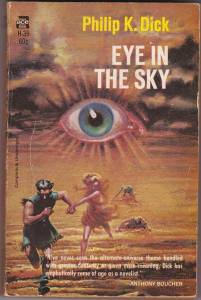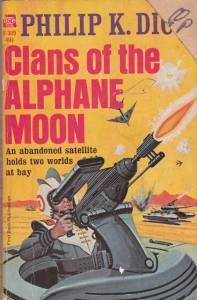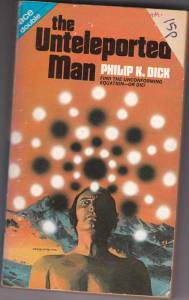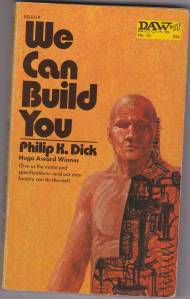Terence Park
TP Archie in other places
Best Philip K Dick Novel
The Guardian ran an article on Dick’s Best Novels chosen by Nicola Barker, Michael Moorcock, and Adam Roberts on 27th August 2017 at Philip K Dick Best Novels. There's all the normal stuff you'd expect to see - Adam Roberts sensibly chose Do Androids Dream of Electric Sheep? You find out Moorcock's take on Dick –as editor of New Worlds, Moorcock sought out voices to flesh out his vision of Science Fiction, indeed Moorcock was one of the high prophets of New Wave SF. Nicola Barker's take set my brain into gear.
Dick: “the core of my writing is not art, but truth”, and – still more perplexingly: “I am a fictionalising philosopher, not a novelist."
Nicola Barker: deny it as he might, he is a novelist
This misses the point; Dick didn't fit into the traditional author-publisher mould. Even now, a publisher would be itching to hack through his work.
In 1960 Dick was willing to take twenty to thirty years to succeed as a literary writer. His overtures into mainstream were declined - rightly so; his unique talent would have been destroyed by the editing process and, on a more selfish note, he'd have been lost to SF.
His work survives because he found a way through - first via the Science Fiction magazines and then Ace Books. Remember the Ace smaller format? they used to drive me mad while trying to force my makeshift library into some form of neatness. Back in 50s and 60s Ace was one of the big two US SF paperback publishers (the other being Ballantine). Ace books woes in the mid-1960s - they could no longer pay authors reliably - would have affected him (Ace were boycotted over a Lord of the Rings copyright infringement - they settled but their business was damaged). It's round about that time that Dick's output declined - I've always wondered if this resolved in some way to the question: how can you write with no pay? Upfront royalties were significant in the Ace business model. Bringing me to my favourite Dick novel.
Galactic Pot-Healer
I fed my early Science Fiction addiction via Burnley Library and, when I could afford it, used paperbacks from the second hand book stalls on Burnley Market. This gave me cross section of beat up (but treasured) US SF editions which is how I discovered Dick. Most of my 40+ collection of Dick's books are pre-1980. I read all Dick’s SF novels and most of his short stories.

Philip K Dick: Solar Lottery
Arrow Books edition 1972

Now Wait for Last Year
Macfadden Books 1968 edition

Eye in the Sky
Ace Books H39, 1967 edition

Clans of the Alphane Moon
Ace Books 1964 edition, F309

The Unteleported Man
Ace Books double (with Dr. Futurity) 1972 edition

We Can Build You
DAW Books #14 1972 edition
A favourite of mine is Galactic Pot Healer which came out in 1969. I had the 1976 Pan edition (sadly lost in a recent house move).
Joe Fernwright, the protagonist, lives in a future Earth with intriguing yet disturbing resonances to the here and now. He repairs art on a commission basis but has virtually no work (gig! gig! gig!. He is hired by a powerful being - Glimmung - for a one-off bit of art restoration. The restoration project involves beings from different planets and as it progresses, Joe strikes up a romantic relationship. In the background, Glimmung is in a struggle with the Kalends, which manifest through a book that foretells the future. This struggle is desire vs the inevitable but which is fake, Glimmung's words or the Book of the Kalends? I can so easily imagine the kind of Earth Dick describes (in my head we're almost there). The work transmogrifies via the gestalt... but Joe Fernwright chooses to go back to normality.
Telling the difference between the fake and the real is more than keeping up appearances, it's about preserving normality, without which people (beings) don't function. Galactic Pot Healer is a transitional work, yesteryear's mutants, ESP, precogs etc are well on their way to VALIS. It contains many of the darkly funny moments I like about Dick's work. He is an acquired taste but once you slip through the doorway, he writes an engaging tale. Dick's work evolves into his exegesis. He also did drugs. Are the two connected?
Dick and Drugs
Drug damage? Certainly - Dick acknowledged this. Did drugs invalidate his message? I'd say both yes and no and then as a rider, would add that this is up to the reader to decide. Importantly he put stuff in the public domain that stretched the genre. SF / Fantasy normally struggles when depicting metaphysical matters - with Dick it just works. It took me a long time to realise he was well read (I was a product of lower class inverse snobbery and despised arts, philosophy etc - it took some autodidact to catch up on where he was at). Most of his work is good - the early SF novels are the least 'Dick-like' but these are a must for those who want the journey.
The overall impact of drugs? I just accepted them as part of him as opposed to a separate influence. On the doing of drugs, I've seen it do damage to those around me - I see it as not too dissimilar to the continuous intake of media input of only one kind - it distorts your perceptions and leaves permanent marks that aren't too easy to shuck off. I get it that just as speed, or whatever, helps keep going on the job, it can help churn out wordage. Do drugs open the doors of creativity or just passive consumption? Of course a writer can interpret (words are his work) but all that's actually happening is for a few brief hours, the filters of everyday existence are slackened off. In my case (as a writer) I rarely write under the influence of alcohol - or even too much coffee.
Dick died as Blade Runner came to completion. Since then more of his works have leaked into the media and his reputation has grown. imho he died too soon.
Philip K Dick’s Electric Dreams airs on Channel from 4, 17th September 2017.
In Perspective
I well remember Michael Bishop’s Philip K Dick is Dead, Alas. Dickanian? Yes. Ultimately I read little beyond chapter 1. Then wasn’t the time to write about Dick in a Dickanian style. It wasn't the right postscript to Dick. A good postscript would be someone to carry forward the baton Dick let drop. You watch and you wait. He, or she, must be out there, somewhere; meanwhile we look back to the Master. Ever decreasing circles.

Philip K Dick is Dead, Alas - Michael Bishop
Grafton edition 1988
I’ve read a lot of Golden Age SF plus a fair sampling of authors up to the 80s: Aldiss, Anderson, Asimov, Ballard, Bradbury, Clarke, Farmer, Herbert... to name a few (there's 1,500 genre paperbacks in my library) eventually you get to a point where formulaic fiction begins to irritate you. I got my intellectual kicks from Idries Shah's works on Sufism. His Darkest England delves entertainingly into the character and mores of the English. Caravan of Dreams is a more general work on Eastern thought. For an eclectic takes on space fiction, Doris Lessing, who moved in the same social circles as Idries Shah, produced a 5 volume work: Canopus in Argos. I'm easily led astray by the history of other civilisations. At present that revolves around Central Asia, nomadic eruptions and the Khwarezmian Shahdom. I pretend to myself it's research for a Fantasy project but the reality is how can you write about the rise and fall of galaxy, or even star spanning civilisations if you haven’t grasped the emergence and subsequent collapse of our own great civilisations?
* * * the above is from my WordPress blog * * *
The Poll...
excludes posthumous publication of Dick's non-SF novels.
The titles are ordered according to the published date of the editions in my possession.
It's okay to have more than one favourite, honest.
The Guardian ran an article on Dick’s Best Novels chosen by Nicola Barker, Michael Moorcock, and Adam Roberts on 27th August 2017 at Philip K Dick Best Novels. There's all the normal stuff you'd expect to see - Adam Roberts sensibly chose Do Androids Dream of Electric Sheep? You find out Moorcock's take on Dick –as editor of New Worlds, Moorcock sought out voices to flesh out his vision of Science Fiction, indeed Moorcock was one of the high prophets of New Wave SF. Nicola Barker's take set my brain into gear.
Dick: “the core of my writing is not art, but truth”, and – still more perplexingly: “I am a fictionalising philosopher, not a novelist."
Nicola Barker: deny it as he might, he is a novelist
This misses the point; Dick didn't fit into the traditional author-publisher mould. Even now, a publisher would be itching to hack through his work.
In 1960 Dick was willing to take twenty to thirty years to succeed as a literary writer. His overtures into mainstream were declined - rightly so; his unique talent would have been destroyed by the editing process and, on a more selfish note, he'd have been lost to SF.
His work survives because he found a way through - first via the Science Fiction magazines and then Ace Books. Remember the Ace smaller format? they used to drive me mad while trying to force my makeshift library into some form of neatness. Back in 50s and 60s Ace was one of the big two US SF paperback publishers (the other being Ballantine). Ace books woes in the mid-1960s - they could no longer pay authors reliably - would have affected him (Ace were boycotted over a Lord of the Rings copyright infringement - they settled but their business was damaged). It's round about that time that Dick's output declined - I've always wondered if this resolved in some way to the question: how can you write with no pay? Upfront royalties were significant in the Ace business model. Bringing me to my favourite Dick novel.
Galactic Pot-Healer
I fed my early Science Fiction addiction via Burnley Library and, when I could afford it, used paperbacks from the second hand book stalls on Burnley Market. This gave me cross section of beat up (but treasured) US SF editions which is how I discovered Dick. Most of my 40+ collection of Dick's books are pre-1980. I read all Dick’s SF novels and most of his short stories.

Philip K Dick: Solar Lottery
Arrow Books edition 1972

Now Wait for Last Year
Macfadden Books 1968 edition

Eye in the Sky
Ace Books H39, 1967 edition

Clans of the Alphane Moon
Ace Books 1964 edition, F309

The Unteleported Man
Ace Books double (with Dr. Futurity) 1972 edition

We Can Build You
DAW Books #14 1972 edition
A favourite of mine is Galactic Pot Healer which came out in 1969. I had the 1976 Pan edition (sadly lost in a recent house move).
Joe Fernwright, the protagonist, lives in a future Earth with intriguing yet disturbing resonances to the here and now. He repairs art on a commission basis but has virtually no work (gig! gig! gig!. He is hired by a powerful being - Glimmung - for a one-off bit of art restoration. The restoration project involves beings from different planets and as it progresses, Joe strikes up a romantic relationship. In the background, Glimmung is in a struggle with the Kalends, which manifest through a book that foretells the future. This struggle is desire vs the inevitable but which is fake, Glimmung's words or the Book of the Kalends? I can so easily imagine the kind of Earth Dick describes (in my head we're almost there). The work transmogrifies via the gestalt... but Joe Fernwright chooses to go back to normality.
Telling the difference between the fake and the real is more than keeping up appearances, it's about preserving normality, without which people (beings) don't function. Galactic Pot Healer is a transitional work, yesteryear's mutants, ESP, precogs etc are well on their way to VALIS. It contains many of the darkly funny moments I like about Dick's work. He is an acquired taste but once you slip through the doorway, he writes an engaging tale. Dick's work evolves into his exegesis. He also did drugs. Are the two connected?
Dick and Drugs
Drug damage? Certainly - Dick acknowledged this. Did drugs invalidate his message? I'd say both yes and no and then as a rider, would add that this is up to the reader to decide. Importantly he put stuff in the public domain that stretched the genre. SF / Fantasy normally struggles when depicting metaphysical matters - with Dick it just works. It took me a long time to realise he was well read (I was a product of lower class inverse snobbery and despised arts, philosophy etc - it took some autodidact to catch up on where he was at). Most of his work is good - the early SF novels are the least 'Dick-like' but these are a must for those who want the journey.
The overall impact of drugs? I just accepted them as part of him as opposed to a separate influence. On the doing of drugs, I've seen it do damage to those around me - I see it as not too dissimilar to the continuous intake of media input of only one kind - it distorts your perceptions and leaves permanent marks that aren't too easy to shuck off. I get it that just as speed, or whatever, helps keep going on the job, it can help churn out wordage. Do drugs open the doors of creativity or just passive consumption? Of course a writer can interpret (words are his work) but all that's actually happening is for a few brief hours, the filters of everyday existence are slackened off. In my case (as a writer) I rarely write under the influence of alcohol - or even too much coffee.
Dick died as Blade Runner came to completion. Since then more of his works have leaked into the media and his reputation has grown. imho he died too soon.
Philip K Dick’s Electric Dreams airs on Channel from 4, 17th September 2017.
In Perspective
I well remember Michael Bishop’s Philip K Dick is Dead, Alas. Dickanian? Yes. Ultimately I read little beyond chapter 1. Then wasn’t the time to write about Dick in a Dickanian style. It wasn't the right postscript to Dick. A good postscript would be someone to carry forward the baton Dick let drop. You watch and you wait. He, or she, must be out there, somewhere; meanwhile we look back to the Master. Ever decreasing circles.

Philip K Dick is Dead, Alas - Michael Bishop
Grafton edition 1988
I’ve read a lot of Golden Age SF plus a fair sampling of authors up to the 80s: Aldiss, Anderson, Asimov, Ballard, Bradbury, Clarke, Farmer, Herbert... to name a few (there's 1,500 genre paperbacks in my library) eventually you get to a point where formulaic fiction begins to irritate you. I got my intellectual kicks from Idries Shah's works on Sufism. His Darkest England delves entertainingly into the character and mores of the English. Caravan of Dreams is a more general work on Eastern thought. For an eclectic takes on space fiction, Doris Lessing, who moved in the same social circles as Idries Shah, produced a 5 volume work: Canopus in Argos. I'm easily led astray by the history of other civilisations. At present that revolves around Central Asia, nomadic eruptions and the Khwarezmian Shahdom. I pretend to myself it's research for a Fantasy project but the reality is how can you write about the rise and fall of galaxy, or even star spanning civilisations if you haven’t grasped the emergence and subsequent collapse of our own great civilisations?
* * * the above is from my WordPress blog * * *
The Poll...
excludes posthumous publication of Dick's non-SF novels.
The titles are ordered according to the published date of the editions in my possession.
It's okay to have more than one favourite, honest.

